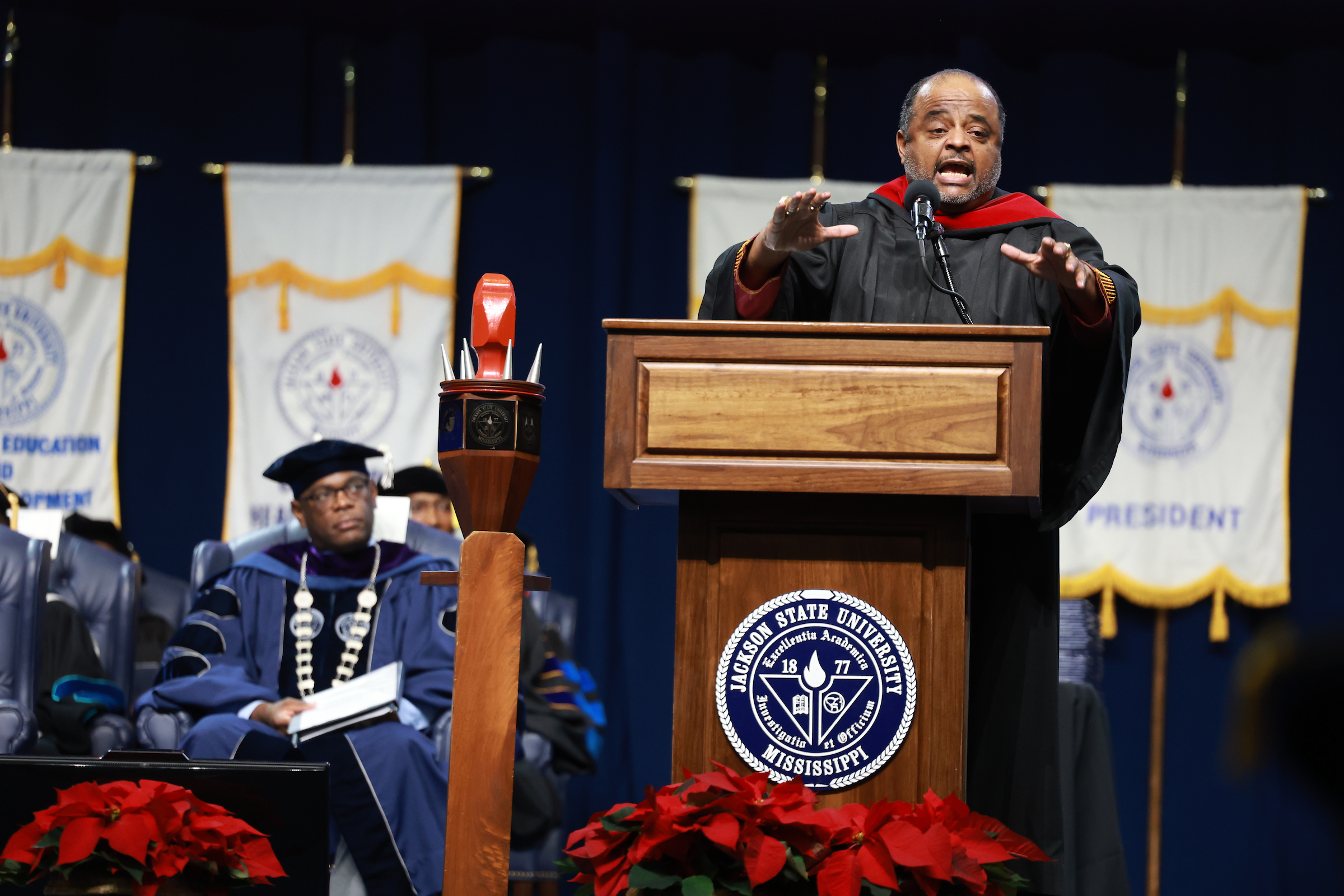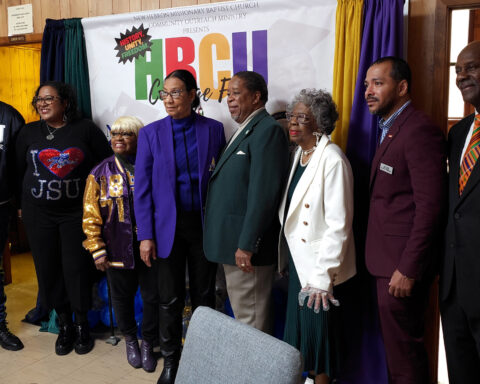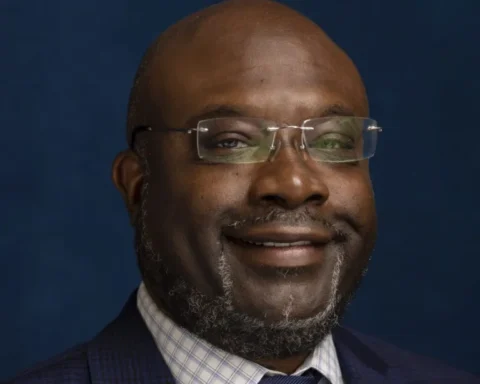By Rachel James-Terry
Jackson State University’s Fall 2022 commencement was a celebration of the ultimate academic milestone for the more than 500 graduates inside the Lee E. Williams Athletic & Assembly Center on Friday, Dec. 9, 2022.
The keynote speaker was award-winning journalist Roland S. Martin, who is the host and managing editor of #RolandMartinUnfiltered, the first daily online show in history focused on news and analysis of politics, entertainment, sports, and culture from an explicitly African-American perspective.
JSU President Thomas K. Hudson, J.D., greeted the audience with enthusiasm. “It is indeed an honor for me to preside over this commencement exercise as we salute the awesome class of 2022,” he said.
Hudson thanked and recognized the families and friends in attendance, saying they have gone above and beyond in supporting the graduates in many ways. He further acknowledged JSU faculty, staff, alumni and the university’s commencement committee before turning his attention back to the Fall Class of 2022.
“This is your day. We are here to celebrate you. So, I encourage you to enjoy this accomplishment, for it is a tremendous milestone in your life and a major step in your career. Congratulations, and enjoy your ceremony,” he urged.
Graduating senior Aria Brent served as the student speaker for the occasion. The journalism and media studies major told her peers that the one word she would use to describe their time at “Thee I Love” was growth.
“The story of becoming a JSU Tiger is summed up with three T’s,” she said. “Trial, tribulation and triumph.”
Upon her arrival at JSU as a freshman, the Columbus, Ohio, native said she looked forward to having her mind challenged, and her life changed. Brent summarized her thoughts about the challenges she and her peers faced during matriculation. The most significant being the COVID-19 pandemic. Still, she emphasized that they overcame those obstacles, and despite the trials, they have now triumphed.
“Please understand that growth isn’t always linear. Sometimes you will digress before you can progress, and other times you will feel extremely stagnant. The important thing is to keep going,” Brent said.
Martin took to the podium to “bring the funk.” Based on the crowd’s response, he did just that.
The four-time author reminded the graduates that “you belong in every room you are about to enter” before requesting that they repeat the phrase to their nearby peers for good measure.
Martin then shared a story about one of his nine nieces, now in college. He recalled that when she was in kindergarten, there was a noticeable change in her joyous free spirit.
“One day, she began to ask us, ‘Is this ok?’ ‘Is this ok?’ It was weird because that was never Anna,” Martin explained.
It was later revealed that Anna’s teacher had criticized a picture the kindergartener had drawn by telling her it was not good.
“From that point on, Anna began to question herself and question what she did,” he shared.
As a result of the interaction, Martin had his niece removed from that class. “It offended us that a teacher would somehow stop this amazing, wonderful mind and begin to say her artwork wasn’t good enough, when she’s a kindergartener, when she should’ve been teaching them to think far beyond what they were actually doing,” explained the four-time NAACP Image Award winner.
Martin said he is reminded of this story whenever he encounters someone suffering from imposter syndrome. The syndrome is defined as a “psychological occurrence in which an individual doubts their skills, talents or accomplishments and has a persistent internalized fear of being exposed as a fraud.”
“I’ve heard a number of brothers and sisters who are CEOs say that they have imposter syndrome. They feel as if they have not earned [the right to] or don’t belong in certain places,” he said.
Martin described the feeling as strange, saying he was never one to believe there are places where he does not belong. In fact, the journalist has been in rooms with some of America’s most elite figures throughout his career. He has interviewed multiple U.S. presidents, distinguished entertainers, and top athletes.
“As people of African descent in this country, from the inception, we have been made to believe and think, and we passed it on to multiple generations, that we are second class,” Martin said.
He shared that while at TV One, home of his former show, “News One Now,” staffers would say, “We’re a Black network,” in a manner that suggested the show was somehow inferior to other shows due to its association with Blackness.
“And, I would say to them if anyone says that again you will not have a job because the statement alone implied what we were doing was not as good as someone else,” he said.
Martin touched on how Black newspapers would often be overlooked by politicians opting to share their stories and interviews with the daily newspapers.
“I have refused in my career and life to believe what we have is second class,” said Martin, who spent six years as a contributor for CNN. “I refuse to allow others around me to have that mindset because the reality is what we have always done has been first class.”
Martin then acknowledged pioneer Black journalists and media outlets like The North Star, a nineteenth-century anti-slavery newspaper published by abolitionist Frederick Douglass and investigative journalist Ida B.Wells-Barnett, who was a founding member of the NAACP. He called out the greatness of Robert Abbott, who founded the Chicago Defender in 1905, which grew to have the highest circulation of any Black-owned newspaper in the United States.
“I think of all of these institutions, Ebony and Jet, that actually told our stories and carried the weddings and birthdays of Black people when mainstream media would not even mention our names. I have refused to allow, even in the 21st Century, for anybody to act as if we don’t belong where we are,” Martin sermonized and was met with applause.
He detailed that the cycle repeats generationally when Black people pass down a second-class mindset and let others define who they are or convince them that they don’t belong.
“Then it means when we’re in the workplace, we’re not negotiating how we should be. We’re not asking for the promotion the way we should be. We’re not demanding the same resources the way we should be,” he declared.
Martin said he is unwilling and unable to allow his Blackness to have a Black tax or for anyone to limit somehow “who we are, what we can do, and then say what we do is simply not good enough.”
Labeled “The Voice of Black America,” Martin seemingly lived up to his moniker, imploring listeners never to walk into a room and believe they do not belong. He then added that when one walks into a room, folks should know they are in the room.
“There are some folks who are present, but there are some folks who have presence,” he said, encouraging graduates to embrace their confidence and swag and not to let others deter them or box them in despite the relationship.
In closing, the founder of the Black Star Network quoted a scene from Ava Duvernay’s movie, “Selma,” and informed JSU graduates that they have been prepared for this day.
“You have been positioned by God to live in this moment of history to be able to create a new world that we’ve never seen before. Don’t let anybody deny you your place in history to be able to redefine America in a new image,” Martin pressed. “This is your moment to lead. This is your moment to create. This is your moment to stand up. This is your moment to be able to challenge and show the world exactly who you are and what we are made of.”





